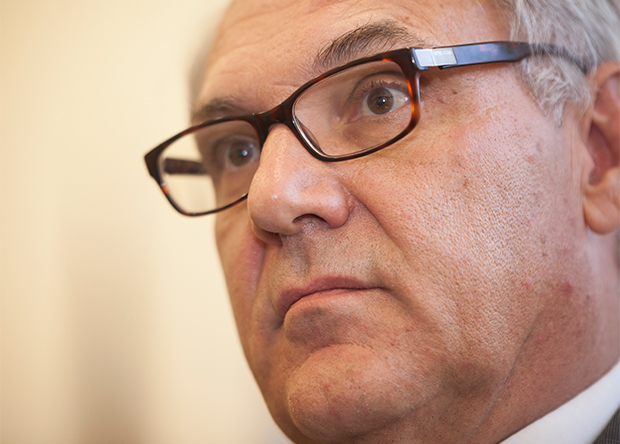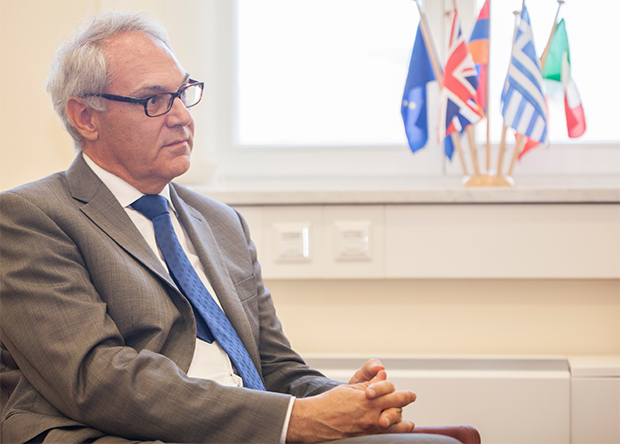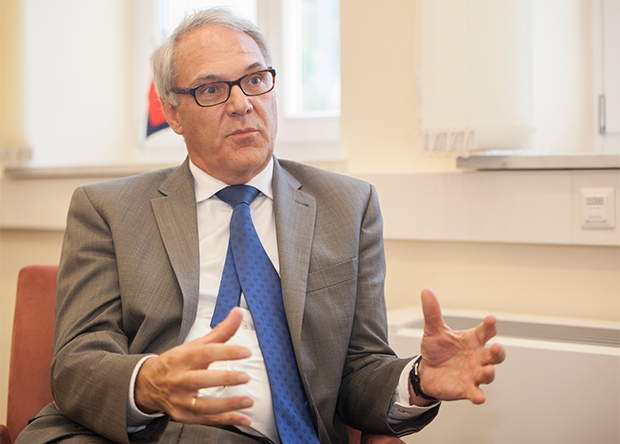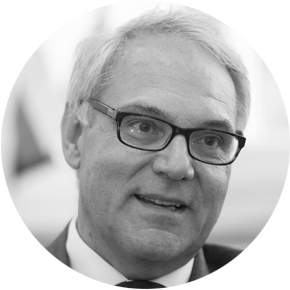Mediamax’s exclusive interview with outgoing German Ambassador Matthias Kiesler
What was your first thought when you learned you would be going to Armenia as an Ambassador?
It was my first ambassador posting, so I was a little nervous. Before I served in Muslim-majority countries and worked in Yemen, Pakistan, Egypt and Kosovo, but then I was really curious of what to expect in a country of old tradition, which was the first to adopt Christianity as a state religion. So, I was a little bit nervous, but full of curiosity.
You have served in Armenia for 4 years. What was the most interesting event or achievement?
The political development in Armenia has been very interesting for me. We saw the four-day war in April of 2016, which was very unfortunate, then we had the occupation of the police station in July of the same year, and of course, the Velvet Revolution. It is sometimes a once in a lifetime experience for a diplomat, to be present when such important changes are taking place in the country.
The visit of Angela Merkel [in August 2018-Mediamax] was the first visit of the German head of state and government to Armenia, so it was definitely one of the highlights.
When I look at the development over these four years, we have always had a good relationship with Armenia, but I feel that in the last four years we have improved it in a lot of aspects. We founded the German Business Association and the Goethe Center, enlarged the number of schools we support with German language education, so I can say that after these four years the good relationship between Armenia and Germany has become an excellent relationship.
What will be your advice to your successor?
I think the main focus should be to support Armenia, both the government and the parliament, in the process of further democratization, modernizations and reforms. It is also very important that Germany will support the judicial reform as well. It is a very big project, and I think Germany should participate and support the Armenian side.
 Matthias Kiesler
Matthias KieslerPhoto: Mediamax
Overall, there are many areas where we could do better. The number of schools which we support could gow, and so could be the economic reforms, the latter through our development agency GIZ. There are a lot of things still to do, but the foundation is laid. We have excellent relationship with the government and the parliament, so I can only encourage my successor to follow the path that my predecessors and I laid out.
The judicial reform is high on the agenda in Armenia. Do you believe the Armenian government did the right thing by initiating the reform? Do you see any challenges it might face?
It is absolutely necessary to improve the judiciary. The judiciary is fundamental for the functioning of the democratic system. If you don’t have independent judges, people lose the trust to judiciary and the state, so it is very important to start with the judiciary reform.
It is very good that the Council of Europe and the European Union are involved in this process. Now we are in the period when we find out what is important for the country and what is feasible, what can be done to achieve quick results. I believe the Prime Minister and his government are very much on the right track, and now is also the time to find out what can be done with concrete steps.
The opponents of the government claim that the Prime Minister is trying to use judiciary as a political tool against the opponent and puts pressure on judges. Do you think these claims are grounded?
I don’t have any indications on this, but I think these topics should be discussed between the government and the opposition. It is not my task to comment on these issues.
In your opinion, what is the biggest challenge for Armenian government?
There is strong political will by the Prime Minister and all ministers, which is the most important thing. It is the basis, and it is a very good basis. Now it is time to formulate the strategies and the concrete steps for how to implement them. We are very optimistic that it will be done, and then Armenia can include the international community, the donors. Germany will see how we can complement the efforts of the government and the parliament, what we can do. The ownership lies with the Armenian government, the whole society, and the international community, like Germany, can assist in these efforts.
 Matthias Kiesler
Matthias KieslerPhoto: Mediamax
Judging by the statements made by Armenian and EU officials after recent the Partnership Council in Brussels, both sides happy with how the process goes. Do you have any comments on the implementation of CEPA?
We are in the process of finalizing the roadmap to see what concrete steps will follow. It is a huge project and a huge opportunity for both sides to fill the CEPA with life and concrete projects. As I said, ownership lies with the Armenian side. When they have good ideas for projects, I think the European Union is more than happy to respond to these requests.
During past 4 years, the German Embassy has been serving as liaison embassy for NATO. Could you comment on the Armenia-NATO relations? Many consider them limited politically.
Of course, there are political limitations, but it is agreed between NATO and Armenia how far the Armenian side will go to deepen the relations. We have a lot of projects. One of them is that Armenian armed forces are a part of the Resolute Support Mission together with the German armed forces. Recently we implemented a project of dismantling decommissioned military vehicles through the NATO-Armenia Trust Fund, and in this case Germany is the lead nation. Every year we organize together a NATO Week. Sometimes I feel that not everybody knows about NATO and what our concept is. We offer projects and cooperation, but we do not impose anything. That is an important thing to know, and what I’ve seen in the last four years is lots of improvement in implementing these projects.
What has been your biggest discovery in Armenia? What will you remember the most about the country?
There are a lot of things I will remember. I love the landscape, I like to go hiking, so that was very special. Also, the cultural scene in Armenia was very special, both the old traditions and the classical music. I think I’ve never been so many times in concert halls as here. I didn’t know a lot about Armenia in the beginning, but very soon I realized the high standard of culture here, be it paintings, music or literature. This is a really great area where we could work more together, that is the reason why we are so interested in having a Goethe center and more bilateral projects here, knowing that the level and the standard of culture is so high in this country. It is a big plus.
 Matthias Kiesler
Matthias KieslerPhoto: Mediamax
The second thing I found fascinating is how you deal with new technologies. For example, the Tumo Center. We don’t have something like that in Germany. Our interest is somehow to also implement, to learn from the Armenian experience when it comes to the IT sector. We in Germany are in the process of digitization, which we understand countries like Armenia are sometimes further ahead than big countries like Germany. So, we are working to establish Tumo centers in Germany. This will be a project for the next coming years.
Ara Tadevosyan talked to Matthias Kiesler
Photos: Emin Aristakesyan



























Comments
Dear visitors, You can place your opinion on the material using your Facebook account. Please, be polite and follow our simple rules: you are not allowed to make off - topic comments, place advertisements, use abusive and filthy language. The editorial staff reserves the right to moderate and delete comments in case of breach of the rules.